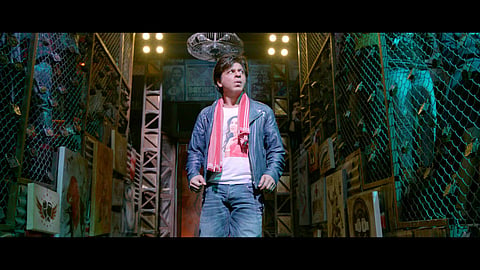

A lot seems to be riding on Zero, Aanand L Rai’s big-budget romantic drama that’s expected to restore the superstardom of Shah Rukh Khan, after a rough patch which includes films like Raees and Jab Harry Met Sejal. The film, co-produced by Rai’s Colour Yellow Productions and Khan’s Red Chillies Entertainment, features extensive use of visual effects, something that Khan deems imperative to our modern-day film experience. “People of my age are perhaps the last generation that will accept a tacky film, just because it's an Indian film. Today's kids won't be forgiving of mediocre visual and sound experience, because they are already used to a certain quality,” he says, noting, “People think of VFX as only belonging to films like Baahubali — which is not true. VFX needs to be used even for the smallest of films.”
Written by Himanshu Sharma, Zero stars Shah Rukh in the role of Bauua Singh, a 38-year-old dwarf from Meerut who falls in love with two women: a cerebral palsy-afflicted American scientist, Aafia Yusufzai Bhinder (Anushka Sharma); and an emotionally torn and alcoholic superstar named Babita Kumari (Katrina Kaif). The actor admits Bauua Singh was one of his most technically challenging roles to play, aided in part by the top-notch machinery and compositing expertise procured for the film. “I was mostly shooting in pits, which were dug by removing two-feet boxes from the floor of the sets. That made me the same height as everyone else. My hand and feet movements had to be precise and controlled. My props were made slightly bigger in size: if others were using an iPhone 8, then I’d be given an iPhone 10; if we were reading a book, my book would be little bigger — so that when they shrunk me in post-production, the objects looked natural in my hands. My clothes and fitting sizes were different. We also wanted Bauua to have a little paunch, but not too prominent because he is still a Hindi film hero and has to look attractive.”
Another technical challenge, Shah Rukh points out, was introducing camera movement and dynamism in the VFX-heavy film. As the shots featuring Bauua Singh needed to be filmed several times — such as the actors first, then the crowd and backdrop, and so on — and layered together in post-production, the makers were restricted to using only static compositions in the beginning, which made the film visually unexciting. “To solve that problem, we had to import a machine from US called the TechnoDolly. In fact, it’s used a lot in Game of Thrones. Buying the machine wasn't enough, so we had to get the person who runs it. When the TechnoDolly team arrived, we realised they had their own way of running the machine and understanding. So our director had to learn working with the system from scratch. Moreover, we couldn’t see what we had shot until it was edited together two months later.”
Despite the technological innovations used behind-the-scenes, Shah Rukh insists they never wanted Bauua’s height to become the gimmick or mainstay of the film. The story of Zero, he clarifies, is a small and intimate examination of love and imperfection. “We spend most of our lives thinking, ‘I wish I were happier’ or ‘I wish I were like this…’ We don't realise that nobody’s perfect — except, I joke, Katrina Kaif. I think nobody's perfect either emotionally, mentally or physically. We need to accept that fast, so that we don't waste time wanting to be someone else while life passes us by. Instead of thinking of our imperfection as incompletion, we need to think of it as our uniqueness.”
On several of his films — such as Phir Bhi Dil Hai Hindustani (political satire), Ashoka (period epic) and Ra.One (superhero flick) — being considered ‘ahead of their time’, he says, “When a film flops, the best excuse is to say it was ahead of its time (laughs). Someone asked me 3-4 months ago what this phrase means. Time toh yahi hain, iske aage konsa time hai? But it's good to feel like that. Some films, I agree, were like that. Swades, for example, flopped. Today, everyone remembers it as a lovely film in retrospect. So was it ahead of its time? Or, maybe, we are only realising the relevance of that film now?”
In an acting career spanning over 25 years, Shah Rukh has gone from being a theatre and TV prodigy to becoming a globally-renowned Bollywood superstar. With nearly 90 films and dozens of accolades under his belt, the actor wishes to continue perfecting his craft within the confines of commercial Hindi cinema. “When I came into the industry, a lot of the journalists thought I was rude and arrogant. When I look back at those quotes — ‘I am not junk food, I'm tandoori chicken’; ‘I have come to rule, not to be ruled’ — I realise that I wasn't arrogant; I had lack of knowledge of the art and craft of acting. If you know very little about, say, science, you tend to speak a lot. You assume that the atomic model is all there is — you don't know there's also quantum physics, string theory and wave theory. So I was a lot like that. Today, I find a billion things to work on and perfect in my craft. I may not have the same capability, talent, time or stardom as years go by, but there's no dearth of things I want to improve upon within the commercial setup. Up next, I have a biopic on astronaut Rakesh Sharma. I am already wondering how I should bring dignity to the character. Should I copy him? Should I mimic him? Or should I play him differently with his permission? I wish I knew earlier in my career that there’s so much to do as an actor.”